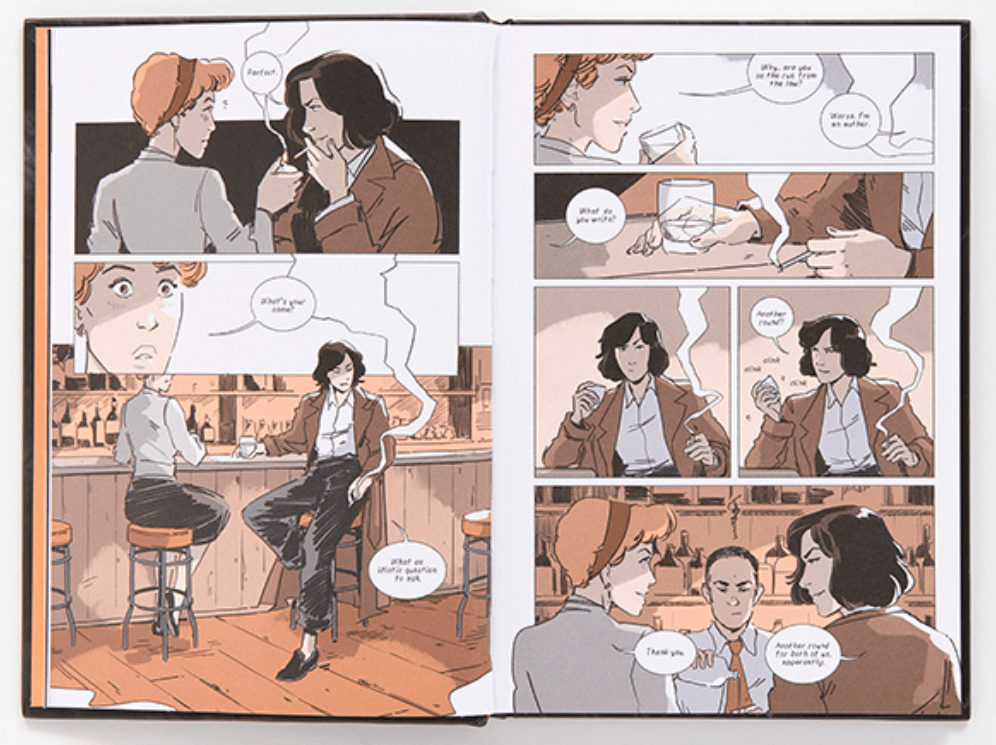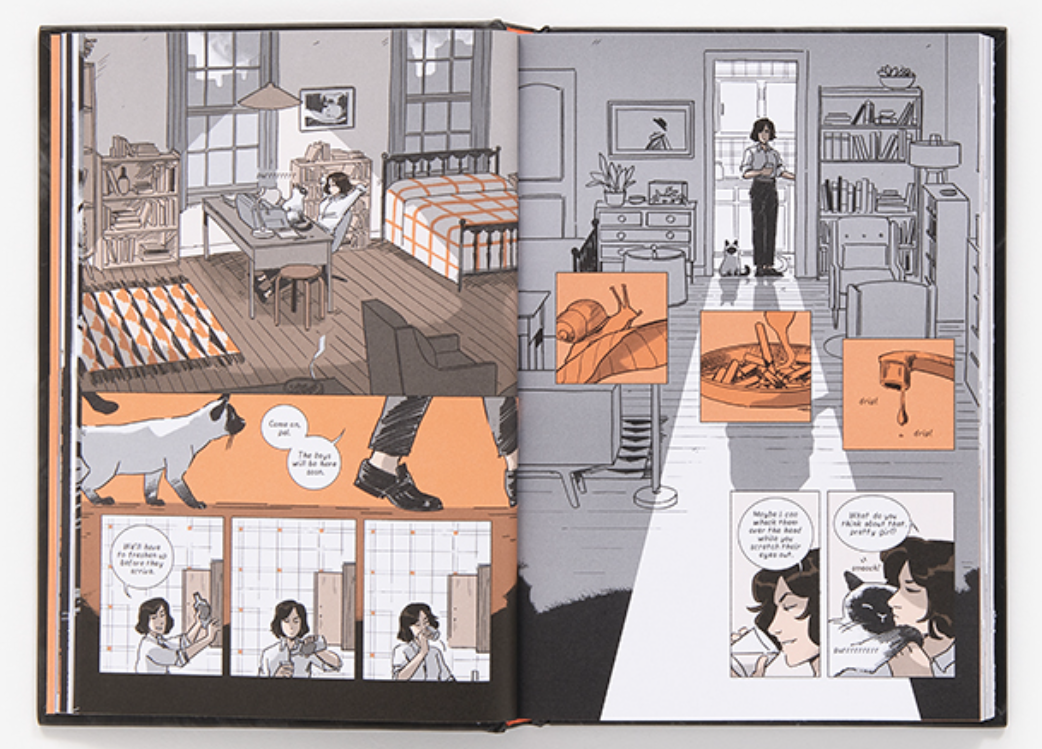There’s this thing professional sports commentators say that’s code for “we’re here to let you enjoy your gladiator bloodlust without judgement!” It’s called “off-the-field issues” — as in, “despite his ‘off-the-field issues,’ he threw five touchdowns last week” — and it means: you can root for anyone, no matter what horrible non-sports things they’ve done, because they’re part of your team. It’s a zero-sum game, and it’s not just sports fans who do it. It’s TV fandoms and actor fandoms and band fandoms and even political fandoms, which inexplicably exist. Our culture encourages us to enjoy what we love without context, to prioritize our happiness about the big win over interrogating the process that got us the trophy.
With all that in mind, I wondered how comics vets Grace Ellis (Lumberjanes, Moonstruck) and Hannah Templer (Cosmoknights) would handle the whole story of Patricia Highsmith’s life in their new graphic novel, Flung Out of Space, which hit shelves last week.
Highsmith is, of course, the author of Strangers on a Train, The Talented Mr. Ripley, and The Price of Salt. That last thing became Carol, one of the most beloved lesbian movies ever made, and these days people even say Highsmith wrote the first gay book with a happy ending. Lots of lesbians even think of Highsmith as Carol Aird, which is to say they think of her as Cate Blanchett, bright as a button and full of faith in humanity. To Grace and Hannah’s enormous credit, they knock Highsmith off that pedestal immediately, and invite readers to witness her struggles as a lesbian writer in the 1940s, while also being clear-eyed about the fact that Pat Highsmith was a pretty terrible person. I don’t mean she was complicated. I don’t mean she had off-the-field issues. I mean she was openly, vilely anti-Semitic, racist, and even bizarrely misogynistic. Grace even ends Flung Out of Space‘s foreword with this: “If you read this book and end up conflicted about Highsmith and her legacy: good.”
Flung Out of Space is an exceptional graphic novel, and a grown-up one too. The pages are full of smoke: clouding frames, wafting into other panels, filling up speech bubbles. They’re also full of Highsmith’s sexy exploits with many, many women. In bars together, in bed together, on top of desks together. Highsmith was a misanthrope. She hated people. What she loved was smoking, drinking, seducing, and dreaming up dark and twisty stories while she was stuck writing comics. She was thwarted at every turn in her pursuit of a serious writing career, and every success she had came in fits and starts as she clawed her way from one kind of notoriety to another. Grace’s dialogue is, as always, full of snap and wit. The story clips along at a train’s pace. And Hannah’s art is all noir, moody and imposing. Their teamwork is on full display in some of the book’s best moments, like when Stan Lee offers Highsmith a job. His speech bubble is airy and full of drawings of caped crusaders. Her speech bubble is a drawings of guns and smoke, all shadows and cynicism.
They cover a huge chunk of Highsmith’s life, too, and find an excellent balance between her sexual conquests, her career, and her quest for real love. There’s no couching the homophobia and sexism Highsmith faced as she chaffed against the confines of the ’40s, but Grace refuses to justify Highsmith’s own bigotry by hiding it behind the oppression Highsmith experienced.
Flung Out of Space feels especially relevant right now, with queer folks’ former faves like Ellen and JK Rowling destroying their legacies before our eyes. And it’s welcome addition to the queer graphic novel and lesbian history canon. Like everything Grace Ellis writes, it just leaves me wanting more. As I finished the book and closed the cover, I said out loud, “Patricia Highsmith was the worrrrrst. I wish this was a series!” Maybe next Grace and Hannah could do Eleanor Roosevelt!





“With former queer faves like Ellen and JK Rowling destroying their legacies before our eyes.”
One – Rowling was never queer, at least to my knowledge. Two, why did it suddenly become OK to shit on women who are victims of sexual abuse because they said or did something problematic?
I absolutely think it’s the old misogynistic society rule. A man can fuck up multiple times and still be called a hero. A woman makes one mistake and she is scorned for the rest of her life.
JK Rowling isn’t queer, but she was a huge hero to the LGBTQ community, many of whom saw an allegory for their own queerness and transness in Harry Potter. She also did not simply say or do something problematic. She is carrying out an escalating and dangerous campaign against trans people — specifically trans women — by spreading lies and misinformation, exploiting false stereotypes, and lifting up LGBTQ people and organizations that are dangerous to ALL gay and trans people. Being an assault survivor does not excuse her actions, anymore than being a victim of homophobia excuses Patricia Highsmith’s anti-Semitism. That is an age-old tactic of white people — white women especially — to sidestep accountability for their actions. I never met a bigger Harry Potter fan than me before Rowling started this horrifying crusade of hers, but I see her vile actions for what they are and will not back down in naming them. You would probably enjoy a lot of my writing about the double standard applied to men and women heroes. In fact, I probably write about it more than anything else. But that’s a strawman argument in this context. JK Rowling is a dangerous bigot who is actively making the world deadlier for a group of people who are most under attack in our community right now.
I understand your frustration, and I do get that you feel betrayed as I’ve been there myself with other creators of content that I like.
But respectfully disagree with everything that you said about her.
I won’t say anything more because I’m pretty sure my comment will get banned.
❤️❤️❤️ TY HH
Exactly!! I am so freaking tired of the internalised misogyny on Autostraddle. And frankly, the idea Rowling fucked up is up for debate. This blanket way of cancelling people you disagree with is dangerous. It cancels dialogue, and signals that even if proven wrong, one should dig their heels in. It smacks of the same bullshit rightwing nutbags pull.
Who has been cancelled? JK Rowling is still getting away with her bs and is using her platform to spread hate. It’s her and the people who agree with her that are like right wing nutters. People in the LGBT community defending her is so messed up and sad. The media attack on trans people is exactly what used to happen to gay people. The tactics are the same. Nothing misogynistic about calling out a woman who is wrong and cruel.
When we go back to concentrate on moments in queer history, we often have to do so by looking through the eyes of people that actually existed, often they must be the ones who hold some prestige because they are the ones whose stories got told and the ones who got the attention. The influence of the times they were surrounded by, combined with their inner personalities can reveal a lot about not only the person in question but also the era they lived in. Patricia Highsmith was definitely a problematic person with many flaws and conflicting sides to her, but she as a historical figure represents one way to look back at her time, not just her character. Not only to educate us on this period, but to also educate us on our brief downfalls as a community and recognize where those before us have failed so we can do better.
Thanks for letting us know about this book Heather! I’m excited to take a look at it.
I have been so intrigued by this project as Grace has tweeted about it, and the art looks SO good!
I think the writers on this site are sometimes a little too happy to hate people.
It’s very binary-thinking of you to read something critical of a famous person’s legacy and summarize it as “hate”. It’s possible to critique someone and not hate them…and in posting a review of this book at all the site is directing more eyes to read about this famous person’s legacy.
Rowling herself doesn’t even deny that she’s a terf anymore, so I’m not sure why there are people in here trying to defend her.
I doubt there’s anyone on earth today who has a stronger influence on public anti-trans sentiment, and the horrifying legislation that follows on its heels, either in the UK or in North America. If you pay for media she produces, you are monetarily supporting someone who causes harm to trans people. That may be an uncomfortable fact for some to swallow, but it is a fact.
the last thing i expected when i clicked on this review was to find comments defending noted transphobe j.k. rowling, but… sure.
thank you for this great review – i’ve been seeing this book everywhere but hadn’t picked it up yet!
Thanks for the review Heather! After reading this the other day, I instantly borrowed the ebook from my local library and devoured it the same night. It was so good and I want more!
Great review! This looks like an interesting book!